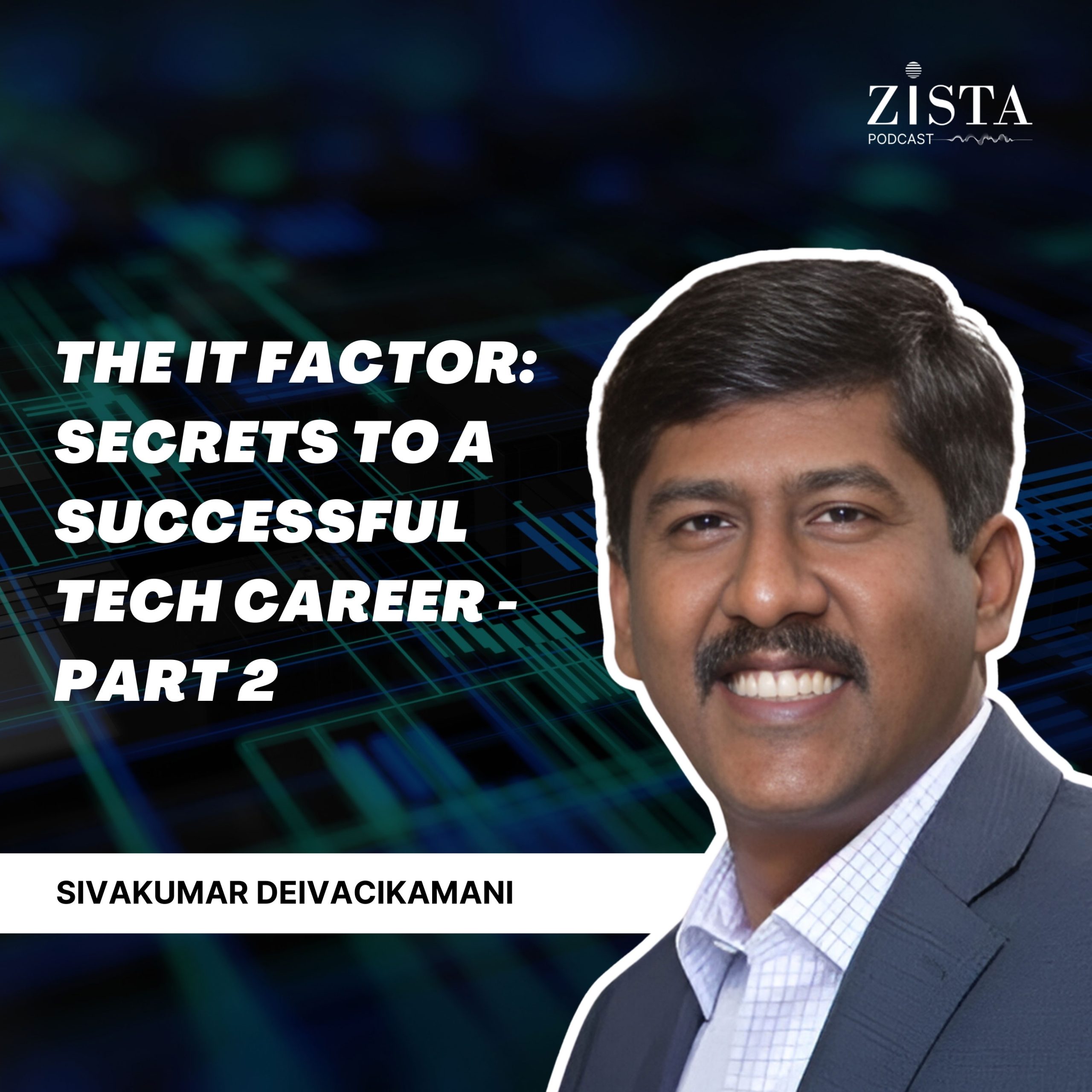Beyond Theory: Practical Tips for STEM Students
Welcome back to The Zista Podcast. Today, as we further explore the vast realm of STEM, we acknowledge the challenges and intricacies that students often face while transitioning from academic settings to the professional sphere.
Joining us on this episode, we have Mr. Gaurav Sri Krishna. With a commendable 34-year journey across IT, Financial Services, and Consumer Goods, and his current role as the Chief Talent Transformation Officer for the BTG Group at TCS, Gaurav brings a wealth of experience to our discussion.
From understanding the importance of adaptability to recognizing the role of mentors, this episode aims to equip listeners with practical insights and actionable advice, setting the stage for success in the ever-evolving world of STEM.
Whether you’re a student charting out your STEM journey or a professional seeking refined insights, this episode promises to be a reservoir of actionable knowledge.
Welcome back to The Zista Podcast. Today’s episode is rooted in addressing a pressing concern for every STEM student: How does one transform theoretical knowledge into tangible career success?
To guide us through this maze, we have the privilege of hosting Mr. Gaurav Sri Krishna. As the Chief Talent Transformation Officer for the BTG Group at TCS, his professional journey is rich, with over 34 years of experience across diverse sectors like IT, Financial Services, and Consumer Goods. His journey, marked by strategy, business development, and operations, offers a goldmine of insights for anyone looking to navigate the complexities of a STEM career.
Join us as we converse about the essential building blocks of a successful STEM career, from adopting the right mindset to harnessing the power of mentorship. With Gaurav’s rich insights as our compass, this episode promises to be an enlightening journey for anyone looking to unlock their full potential in STEM.
KEY TAKEAWAYS
- STEM principles and knowledge are versatile and can be integrated into any field. Therefore, students should pursue what they are really passionate about.
- Open communication with parents and educators can help strike a balance between societal expectations and personal aspirations, leading to a fulfilling STEM career.
- Regardless of career speed, the emphasis should be on continuous learning, innovation, and finding joy in one’s chosen STEM field.
- In the social media age, it’s essential to remain grounded in reality and not get swayed by peer pressure or unrealistic ambitions.
- Whether through silent mentors or direct interactions, mentorship can offer invaluable guidance and insights to STEM students, helping them navigate both professional and personal challenges.
Q1: How can students excel and make an impact in STEM careers?
A: Gaurav emphasizes a unique perspective on STEM, often remarking, “Even a farmer benefits from STEM.” Today’s agriculture might utilize robots, drones, or even new plant cultivars—all advancements from STEM fields. While technology dominates discussions about STEM, the traditional methods remain crucial.
For those venturing into STEM, Gaurav advises a holistic understanding. STEM encompasses science, technology, engineering, and math. Math alone plays a pivotal role in our daily lives, both personally and professionally.
Selecting a passion within STEM can be daunting. This journey typically starts in Grade 10 and continues through graduation. The digital era offers vast resources for exploration—contrasting Gaurav’s student days, which were reliant on libraries and limited teaching aids. Presently, with digital resources at one’s fingertips, students have a vast world to explore, yet they might be unaware of the potential.
Gaurav reiterates that STEM isn’t limited to computer science or artificial intelligence. Numerous fields, such as agriculture or the creation of eco-friendly fabrics, offer opportunities for passionate minds. The challenge often becomes identifying sustainable methods—for instance, discovering environmentally-friendly dyes.
For today’s youth, the key is to observe societal trends and identify where STEM can introduce transformative solutions. Sustainability stands as this century’s primary focus, especially with the looming threat of global warming. Any aspiring STEM professional should prioritize sustainability, ensuring that future generations inherit a thriving planet.
In essence, STEM offers a myriad of possibilities beyond computer science or machinery. It’s about identifying your passion within this broad spectrum and contributing significantly.
Q2: How can students cultivate a mindset for success in today’s ever-evolving world?
A: Gaurav suggests several insights and strategies for students to navigate today’s complex world:
Family Dynamics & Choices: Historically, joint families influenced many life choices. But in nuclear family settings, parents sometimes push their career aspirations onto their children. This has resulted in undue pressure for many, with some even pursuing prestigious institutions like IITs against their will. This kind of pressure can have severe psychological consequences. Engaging in open conversations with parents and teachers can help balance expectations with personal aspirations.
Seek Genuine Advice: Students often need guidance to identify their true passion. Sometimes, well-intentioned advice can snuff out genuine passion, leading to psychological distress. It’s crucial for educators, parents, and the system at large to provide supportive and realistic guidance.
Social Media & Unrealistic Expectations: In the age of social media, it’s easy to feel pressured by peers’ perceived successes. Ambitions like “starting a business by 25 and retiring by 30” are often unrealistic. Life is a continuous journey of learning, growth, and letting go. Gaurav emphasizes the importance of grounding oneself in reality and being wary of digital exaggerations.
Rapid Career Progressions: Previously, career growth followed a steady, predictable trajectory. Now, young professionals sometimes lead large teams, but this rapid progression might not always lead to job satisfaction. It’s essential to recognize the kind of work one truly enjoys – whether it’s constantly changing tasks or more routine ones.
Re-evaluation & Counseling: Career satisfaction is essential for holistic well-being. Those who’ve pursued STEM fields sometimes feel unfulfilled in corporate roles. While success stories of high salaries for IIT graduates make headlines, it’s important to remember that everyone’s journey is unique.
Innovation in Monotony: Even roles that seem mundane at first can offer opportunities for innovation. For instance, a digital marketer feeling stuck could engage with consumers differently, turning routine tasks into invigorating projects.
Mental Well-being & Skills: The psychological impact of career choices extends to personal life. In our digital age, paying attention to soft skills and mental health is crucial. Practicing effective communication, articulation, and meditation can help students find peace and balance in their professional and personal lives.
In conclusion, to thrive in both career and life, one should focus on continuous learning, open communication, setting realistic expectations, and prioritizing mental well-being.
Q3: How crucial is mentorship for the success of STEM professionals?
A: Gaurav emphasizes the invaluable role of mentorship in a professional’s journey, particularly in STEM fields. He outlines two distinct mentorship types. Firstly, there are silent mentors, public figures or role models from whom one can learn without direct interaction. For instance, Gaurav mentions gleaning insights from such figures in his own life. Contrary to the belief that mentorship only materializes in formal organizational settings, mentors can be found in everyday life, like family members, neighbors, or acquaintances. These mentors aren’t always defined by high-ranking professional titles but by their positive character, wisdom, and insights.
If someone, for instance, excels in mathematics or works in a STEM-related field in your community, Gaurav suggests engaging with them. A mentor’s primary role is to listen, understand potential, and provide guidance. They aren’t there to dictate but to help mentees make informed choices. Trust is foundational in this relationship, and if ever a mentee feels pressured into paths they’re uncomfortable with, Gaurav advises them to reassess that mentorship.
Once in a structured environment like a corporation, mentorship often takes a formal turn. Beyond just career advice, mentors can provide guidance on personal life challenges or mental well-being. For those passionate about areas like math but unsure of its application, mentors bridge the gap by directing them to opportunities. Given the crucial role of mentors, Gaurav underscores the need for institutions, be it educational or corporate, to invest in training mentors. This ensures that as the majority of students transition into the corporate realm post-graduation, they’re met with well-equipped guides to navigate their path.




